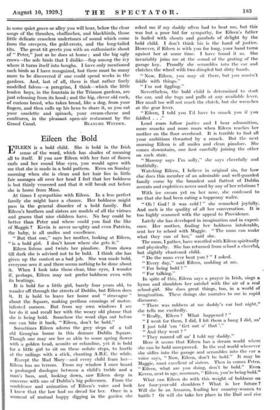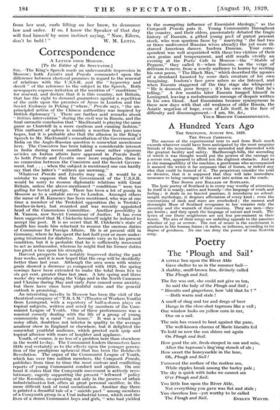Eileen the Bold F H.EEN is a bold child. She is
bold in the Irish sense of the word, which has shades of meaning all to itself. If you saw Eileen with her fuzz of flaxen curls and her round blue eyes, you would agree with me that she is made in a bold pattern. Even on Sunday morning when she is clean and her hair lies in little fair sausages all over her head I feel that her boldness is but thinly veneered and that it will break out before she is home from Mass.
At times I sympathize with Eileen. In a less perfect family she might have a chance. Her boldness might pass in the general disorder of a bold family. But Eileen's brothers and sisters are models of all the virtues and graces that nice children have. No boy could be better than Peter and where could you find the like of Maggie ? Kevin is never naughty and even Patricia, the baby, is all smiles and excellence.
"But that one," says her mother, looking at Eileen, "is a bold girl. I don't know where she gets it."
Eileen listens and twists her pinafore. From dawn till dark she is advised not to be bold. I think she has given up the contest as a bad job. She was made bold, everyone sees it and there seems nothing to be done about it. When I look into those clear, blue eyes, I wonder if, perhaps, Eileen may not prefer boldness even with its beatings.
It is bold for a little girl, barely four years old, to wander off through the streets of Dublin, but Eileen does it. It is bold to leave her home and " stravague " about the Square, making perilous crossings of motor. infested corners. But from my own windows I see her do it and recall her with the weary old phrase that she is being bold. Somehow the word slips out before One can bite it back, "Eileen, don't be bold."
Sometimes Eileen adorns the grey steps of a tall old Georgian house in this demure Dublin Square. Though one may see her as akin to some spring flower with a golden head, aconite or celandine, yet it is bold for a little girl to sit on these sedate steps, to hurtle at the railings with a stick, chanting A.B.C. the while.
Except the Mad Mary—and every child fears her— Eileen has no terrors. From my window I once heard a prolonged duologue between a child's treble and a man's bass, and, looking down, saw Eileen deep in converse with one of Dublin's big policemen. From the confidence and animation of Eileen's voice and look I knew that the law had no dread for her. Once in a moment of mutual happy digging in the garden she asked me if my daddy often had to beat me, but this was but a poor bid for sympathy, for Eileen's father is hailed with shouts and gambols of delight by the bold child. I don't think his is the hand of justice. However, if Eileen is with you for long, your hand turns against her at some time. I have found it so. She invariably joins me at the sound of the grating of the garage key. Proudly she scrambles into the car and clutches the wheel with two dimpled but dirty hands.
"Now, Eileen, you may sit there, but you mustn't fiddle with things."
"I'm not figgling."
Nevertheless, the bold child is determined to start the car, and she tugs and pulls at any available lever. Her small toe will not reach the clutch, but she wrenches at the gear lever.
"Eileen, I told you I'd have to smack you if you fiddled . . ."
Loud roars follow justice and I hear admonition, more smacks and more roars when Eileen reaches her mother on the floor overhead. It is terrible to find all your ambitions thwarted by a smack. But the next morning Eileen is all smiles and clean pinafore. She comes downstairs, one foot carefully joining the other on each stair.
"Mammy says I'm solly," she says cheerfully and truthfully.
Watching Eileen, I believe in original sin, for how else does this member of an admirable and well-guarded family come by the broadest and flattest of Dublin accents and expletives never used by any of her relations ?
With ice cream yet on her nose, she confessed to me that she had been eating a tuppenny wafer.
" Oh ! God ! it was cold ! " she remarked joyfully. And such is the quality of all her conversation. It is too highly seasoned with the appeal to Providence.
Lately she has developed in imagination and in experi- ence. Her mother, finding her boldness intolerable, sent her to school with Maggie. "The nuns can make what they can of her," said she.
The nuns, I gather, have wrestled with Eileen spiritually and physically. She has returned from school a cheerful, but slightly chastened child.
"Do the nuns ever beat you ? " I asked.
"Every day," said Eileen, nodding at me.
"For being bold ? "
"For talking."
In spite of this, Eileen says a prayer in Irish, sings a hymn and shoulders her satchel with the air of a real school-girl. She does great things, too, in a world of imagination. These doings she narrates to me in rapid discourse.
"There was robbers at me daddy's car last night," she tells me excitedly.
"Really, Eileen ? What happened ? "
"I went for them, I did, I hit them a bang I did, an' I just told 'em 'Get out o' that '."
"And they went ? "
"They ranned off an' I told my daddy."
Here it seems that Eileen has a dream world where she can be bold unreproved. In the real world whenever she sidles into the garage and scrambles into the car a voice says, "Now, Eileen, don't be bold." It may be Maggie, most excellent of sisters. Then in comes Peter. "Eileen, what are you doing, don't be bold." Even Keven, next in age, murmurs, "Eileen, you're being bold."
What can Eileen do with this weight of boldness on her four-year-old shoulders ? What is her future ? Will she be an Amazon, leading her country-women to battle ? Or will she take her place in the Dail and rise from her seat, curls lifting on _her brow, to denounce law and order. If so, I know the -Speaker of that day will find himself by some instinct saying, " Now, Eileen,

































 Previous page
Previous page